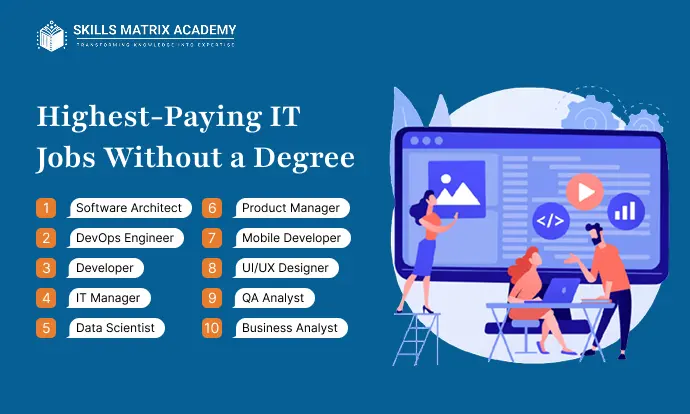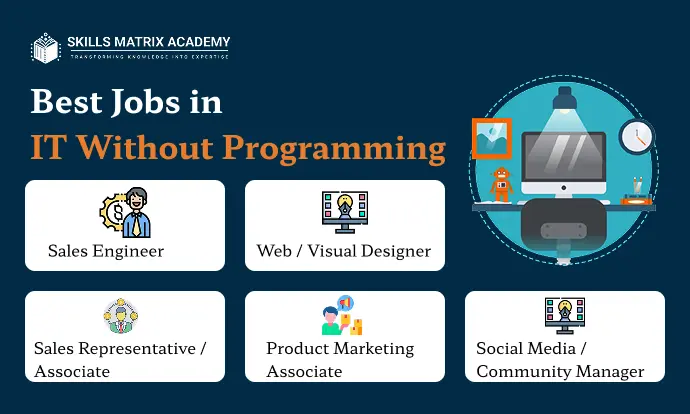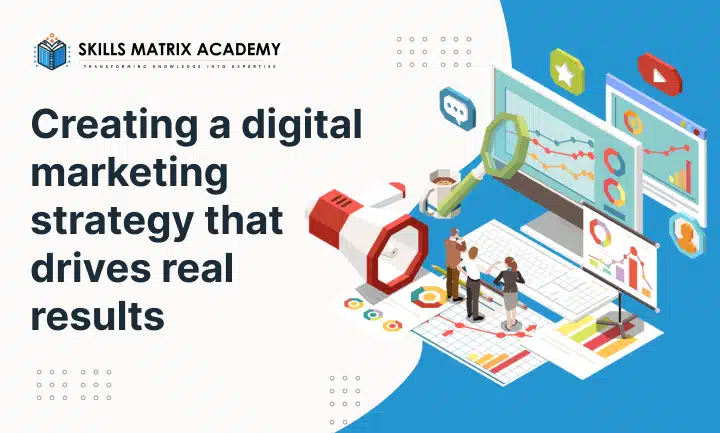How to Get Into the Technology Industry Without a Degree
The technology industry is growing faster than almost any other sector. Every year, thousands of new jobs open up. The best part is—you don’t always need a degree to get one.
You can build skills through self-learning, online certifications, and hands-on projects. Many professionals are already proving that real-world talent in Data Science, Digital Marketing, and Content Writing can beat traditional degrees. This makes it easier than ever to find high-paying tech jobs without a college background.
According to the Bureau of Labor Statistics and Lightcast, tech jobs are expected to grow at twice the pace of the overall job market between 2024 and 2034. Each year, nearly 6% of tech positions open up due to turnover and replacements. That means around 350,000 new workers are required annually, adding millions of jobs by 2034.
This is great news if you want to start a career without a degree. Employers now focus more on skills than formal education. In-demand fields like Data Science, Digital Marketing, and Content Writing are leading the way to high-paying tech jobs.
What Are the Job Requirements in Tech?

In such a fast-changing industry, job requirements are more about skills than degrees. Most companies want candidates who can show:
- Knowledge of current technology trends
- Hands-on experience with tools or platforms
- Transferable skills like teamwork and communication
This shift means even if you don’t have a degree, you can still be a strong candidate. Employers care about results. Problem-solvers are always in demand—that’s what makes you an asset. Jobs in Digital Marketing, Content Writing, and Data Science are great examples of high-paying tech jobs you can land without a degree.
Required Skills for Tech Jobs
Breaking into tech takes more than interest. You need the right skills to succeed. Every role is different, but some abilities are in demand across the industry—especially in Content Writing, Digital Marketing, and Data Science.
Technical Skills You Need
Most tech roles require strong technical knowledge. These skills help you work with systems and tools used every day.
Key technical skills include:
- Coding for apps, websites, and software.
- Programming languages like Python, Java, or JavaScript.
- Data management tools to organize and protect information.
- Customer Relationship Management (CRM) systems streamline the way
- businesses handle, organize, and use customer data.
- Search engine optimization (SEO) to improve online reach in Digital Marketing.
- Data analytics transforms raw information into actionable insights—making it a core pillar of Data Science.
- Project management to deliver work on time.
- Troubleshooting to fix problems quickly.
With these skills, you can compete for high-paying tech jobs in Digital Marketing, Content Writing, or Data Science.
Workplace Skills That Matter
Technical knowledge alone is not enough. Companies also want people with strong workplace skills. These skills demonstrate your ability to work effectively in teams and handle challenges.
Important workplace skills include:
- Communication for clear teamwork in Digital Marketing or Content Writing.
- Problem-solving to handle issues fast.
- Creativity to bring new solutions and fresh ideas.
- Computer literacy for using everyday tools.
- Time management to meet deadlines.
When combined with expertise in Data Science, Digital Marketing, or Content Writing, these skills can help you secure high-paying tech jobs without a degree.
How to Become a Programmer Without a Degree
Do you aspire to be a programmer but lack a degree? Here’s the good news: you don’t need one. In today’s digital world, skills, consistency, and proof of work matter more than formal education. Tech companies care more about what you can build than the certificates on your wall.
If you’re ready to learn and practice, you can start a programming career from scratch. Once you build a strong base, you can even branch into related fields like Data Science, Digital Marketing, or Content Writing. Each of these areas offers high-paying tech jobs and huge growth opportunities.
Let’s break it down step by step.
Step 1: Write Down Your Career Goals
Every successful journey starts with a goal. Clear career goals keep you focused and moving in the right direction.Without them, it’s easy to feel lost, especially when learning coding or debugging.
Ask yourself:
- Why do I want to become a programmer?
- Do I want to build apps, websites, or large systems?
- How will programming improve my life and career?
- Can this help me reach high-paying tech jobs?
For example, you may want to start as a web developer and later grow into full-stack development. Alternatively, you may view programming as a gateway to Data Science or as a tool for Digital Marketing. Some even combine programming with Content Writing, creating SEO-friendly tools or interactive blogs.
Whatever your reason, write it down. Clear goals give you purpose and help you stay motivated when challenges appear.
Step 2: Understand the Software Development Landscape
Before going deep, learn what software development looks like. Programming isn’t just writing code—it’s about solving problems and creating solutions.
The best place to start is with web development. It gives fast results and visible progress. Here’s a simple roadmap:
- HTML & CSS → Build static pages and layouts.
- JavaScript → Add interactivity, like games or apps.
- Databases (SQL) → Store and organize data.
- APIs → Connect front-end with back-end systems.
At this stage, don’t try to master everything. Just explore. Later, you can specialize in areas like Data Science, automation for Digital Marketing, or coding tools for Content Writing. These skills also prepare you for high-paying tech jobs.
Step 3: Choose a Niche
After the basics, choose a niche. Specialization makes you stand out.
Popular paths include:
- Front-End Development → Work on design and layouts.
- Back-End Development → Handle server logic and databases.
- Full-Stack Development → Combine both sides.
- APIs & Integrations → Connect services and build solutions.
But programming also connects with other industries:
- Data Science + Programming → Analyze data and build predictive models.
- Digital Marketing + Programming → Automate reports and create analytics dashboards.
- Content Writing + Programming → Build tools that optimize content and improve SEO.
Each of these combinations opens doors to high-paying tech jobs. Combining different skills not only boosts your value but also opens the door to more career opportunities.
Step 4: Build Real Projects and a Portfolio
Knowledge is important, but proof of skill gets you hired. Employers want to see what you’ve built. That’s why a portfolio is key.
Here’s how to start:
- Build a personal website to showcase projects.
- Upload work on GitHub—even small apps.
- Create dashboards if you’re interested in Data Science.
- Automate tasks in Digital Marketing or Content Writing with Python scripts.
If you don’t have a degree, your portfolio is your evidence of skills.It proves you can use your skills to solve real-world problems. That’s what employers look for in high-paying tech jobs.
To add weight, consider certifications like:
- Oracle Java Programmer Certification
- AWS Developer or Associate
- Google Cloud, Analytics, or Marketing
- Online courses from Harvard, Coursera, or freeCodeCamp
Certifications boost your credibility, especially in Data Science, Digital Marketing, or Content Writing careers.
Step 5: Build Your Network and Start Applying
The final step is putting yourself out there. Don’t wait to feel “perfect”—learning never ends in tech. Even senior developers keep updating their skills.
Ways to grow opportunities:
- Polish your LinkedIn profile → Highlight skills, projects, and career goals.
- Join communities → Reddit, Discord, or coding meetups.
- Try hackathons and coding challenges to test yourself.
- Share your learning journey online. Show projects and progress—it attracts opportunities.
Begin with internships, junior roles, or freelance projects. Companies often value passion and potential more than experience. Once you get your first role, you’ll quickly move toward high-paying tech jobs in Data Science, Digital Marketing, or Content Writing.
And remember, programming isn’t the end of the road. As you gain experience, you can move into specialized areas like Data Science, Digital Marketing, or Content Writing. Each of these paths offers exciting projects, creativity, and the chance to land high-paying tech jobs that can transform your career and lifestyle.
Highest-Paying IT Jobs Without a Degree

A college degree isn’t always required to get high-paying tech jobs.Many professionals have built strong careers in IT with the right skills, certifications, and practical experience.
In fact, several roles in Data Science, Digital Marketing, and Content Writing now compete with traditional IT jobs in terms of salary and growth. The tech world is changing fast, and opportunities are wide open for people willing to learn.
Below is a list of the highest-paying IT jobs for workers without a degree, with salaries often reaching $80,000 or more.
1. Software Architect
A Software Architect makes critical decisions in software development. They set technical standards and guide teams to build reliable systems.
- Handle high-level design choices.
- Ensure consistency in coding practices.
- Align software solutions with business needs.
Median salary: $93,368 without a degree, $97,490 with a degree.
2. DevOps Engineer
A DevOps Engineer sits at the crossroads of coding and IT operations, ensuring software runs smoothly from development to deployment. Their main goal is to automate systems and streamline workflows.
- Manage software development, maintenance, and updates.
- Skilled in coding languages, software engineering, and security systems.
Average salary: $92,644 without a degree, $93,095 with a degree.
3. Developer
Also called computer programmers or coders, developers bring ideas to life by writing code.
- Design software based on user needs.
- Program software using coding languages.
- Test software to remove bugs.
Average salary: Developers typically earn around $92,145 without a degree, rising to $96,550 with a degree.
4. IT Manager
An IT Manager is one of the most trusted IT security professionals. They ensure sensitive systems and information are protected.
- Oversee network security.
- Protect systems from cyber threats.
- Ensure smooth IT operations across the company.
Average salary: IT managers earn around $92,045 without a degree and about $85,519 with a degree.
5. Data Scientist
Data Science is quickly becoming one of the most in-demand fields in IT. A Data Scientist analyzes large data sets and builds predictive tools.
- Use predictive models and algorithms.
- Develop data modeling and production processes.
- Programming languages and machine learning are the core foundation of this field.
Average salary: $92,000 without a degree, $93,713 with a degree.
6. Product Manager
A Product Manager connects business goals with technology. They design the vision and roadmap that guide the creation of new digital products. Work closely with software engineers.
- Define goals, timelines, and priorities.
- Ensure the product meets customer expectations.
Average salary: product managers earn about $88,716 without a degree, rising to $102,156 with one.
7. Mobile Developer
Mobile Developers design apps for smartphones and tablets.They create software that works for users on iOS as well as Android. Build apps for different industries.
- Test, optimize, and release updates.
- Knowledge of cross-platform tools is a plus.
Average salary: Salaries reach $84,204 for non-degree holders and $95,004 for degree holders.
8. UI/UX Designer
A UI Designer focuses on User Interface, while a UX Designer works on User Experience. Together, they design clean and easy-to-use interfaces.
- UI = Look and feel of a product.
- UX is all about the experience a person has while using a product.
- Goal: Make products user-friendly and engaging.
Average salary: $80,500 without a degree, $83,486 with a degree.
9. QA Analyst
A Quality Assurance (QA) analyst ensures products are tested thoroughly before release. Their main role is to find bugs and fix issues.
- Test software for errors.
- Ensure products meet quality standards.
- Work closely with developers to release smooth products.
Average salary: $68,212 without a degree, $66,821 with a degree.
10. Business Analyst
A Business Analyst helps organizations make data-driven decisions. They use data analytics to improve processes and create strong IT strategies.
- Bridge the gap between business and technology.
- Recommend solutions using research and analytics.
- Guide digital transformation projects.
Median salary: $65,449 without a degree, $69,673 with a degree.
Best Jobs in IT Without Programming

Not every IT career requires coding. Surprised? Many people think programming is the only path into tech. But that’s not true.
There are plenty of high-paying tech jobs where coding isn’t needed at all. Some roles even connect with fast-growing fields like Data Science, Digital Marketing, and Content Writing, where creativity and strategy matter more than programming.
Let’s explore some of the best options.
1. Sales Engineer
They use both technical skills and people skills to succeed.Their job is to sell tech products and IT services to companies.
- Average salary without a degree: $79,880
- With a degree: $94,478
If you enjoy explaining tech solutions and showing how products solve problems, this role is rewarding. It’s one of the most stable, paying tech jobs that relies more on strategy and sales than programming.
2. Product Marketing Associate
A product marketing associate designs campaigns and builds materials to promote products. This career is ideal for those who like Digital Marketing.
- Average salary without a degree: $76,233
- With a degree: $74,954
Here, you’ll plan strategies, analyze markets, and work with creative teams. Strong communication and innovation matter far more than coding. This role can also blend with Content Writing and data-driven marketing insights.
3. Web / Visual Designer
Web and visual designers focus on creating appealing layouts, graphics, and user-friendly designs.
- Average salary without a degree: $62,969
- With a degree: $65,492
This career demands creativity, design tools, and storytelling skills, but not coding. If you’re skilled in Content Writing or visual storytelling, you can combine those abilities with design to create engaging websites. Many designers today also collaborate with Digital Marketing teams for better reach.
4. Sales Representative / Associate
A sales representative assists in the selling of IT products or services to end users directly.
- Average salary without a degree: $60,684
- With a degree: $68,122
This role doesn’t depend on technical knowledge or coding. Instead, success comes from communication, problem-solving, and relationship-building. It’s a great entry point into IT, offering access to high-paying tech jobs without a programming background.
5. Social Media / Community Manager
A social media or community manager shapes and maintains a brand’s reputation online. They handle product launches, promotions, and customer engagement.
- Average salary without a degree: $58,899
- With a degree: $48,994
This career is directly tied to Digital Marketing. If you enjoy managing communities, creating engaging posts, or exploring Content Writing, this role is perfect. It’s one of the fastest-growing, paying tech jobs for creative people in the tech industry.
Job Statistics: IT Professionals Without Degrees
Still think you need a degree for success? The data proves otherwise:
- According to the U.S. The Bureau of Labor Statistics reports that roughly a quarter of IT professionals in the U.S. work in core technology positions.
- A CompTIA survey found that 85% of HR leaders support relaxing degree requirements in IT hiring.
This shows employers care more about skills, creativity, and real results than academic qualifications. Whether you’re into Data Science, Digital Marketing, or Content Writing, you can build a rewarding career in tech—even without coding.










